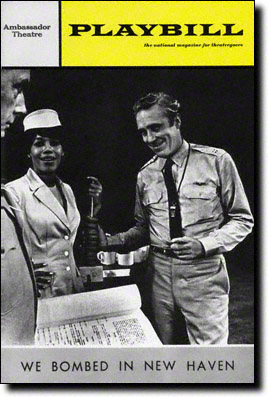
Clive Barnes informed the readers of the New York Times that the play, “We Bombed in New Haven,” by Joseph Heller, was “a bad play any good playwright should be proud to have written, and any good audience fascinated to see.” I was a freshman at Harvard when I headed from Cambridge, Massachusetts, to New Haven, Connecticut, for the opening. I was in awe of the man who had written Catch-22, a novel that had me laughing out loud while sitting on the couch in my Midwestern home during my senior year of high school less than a year before. My interest in getting myself to the play heightened even further on learning that Stacy Keach would play the lead role. On our local PBS station back home, I had seen him in portions of the play “MacBird,” a satire set in the context of the JFK assassination. Keach performed the grasping, lying and scheming LBJ/MacBird character, as he ascended to the White House along with Lady MacBird under suspicious circumstances. The plot was laced with parallels to the events in Shakespeare’s Scottish play.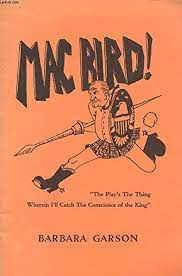
My enthusiasm wasn’t just for Joseph Heller’s play. It was for a whole coming-of-age experience. Attendance at the Yale Rep Theater was the central event. But it was far from the entirety of the drama.
I was biased, but I ended up loving the play, embracing it with far more enthusiasm than Mr. Barnes of the Times.
Then again, my enthusiasm wasn’t really just for Heller’s play. It was for a whole coming-of-age experience that I managed to orchestrate. My attendance at the Yale Repertory Theater–where, fittingly, given its title, the play opened for a few weeks before heading to Broadway—was the central event within that experience. But it was far from the entirety of the drama.
My first step had been to confirm that if I got a ticket for the show, I would be able to crash with my two Indianapolis friends who were students at Yale and shared a suite in Yale’s Trumbull College. If they were ok with that, I then had to ask if one of them would please pick up a ticket for me. This was before you could call up the Box Office and pay over the phone, and a full dozen years before I would own my first credit card. If I were able to line up my ticket and my lodging, I would then have to find out what was the best hitchhiking route to get me to New Haven.
I was able to make all of that happen. To add to the glory, it took place just days after I turned 18, in December 1967. I felt pretty mature and independent to make all this happen for myself (and by myself).
Dave and Bill were first and foremost my brother Leon’s high school friends from back home, but they had been accepting of me the previous year when I spent a night in their room while visiting Yale as an applicant. I was pretty sure they would be just as welcoming this time, and sure enough, they were fine about putting me up and also about buying me a ticket, with the expectation I would repay them when I arrived.
Asking kids in my dorm who were from the region, it didn’t take long to find someone who could advise me on thumbing to New Haven. Curiously, the student who patiently gave me directions was a tall, preppy-looking, sandy-brown-haired kid whose hair flapped down in front of one of his eyes until he periodically flicked it away. I am omitting his name because my only other meaningful recollection about him is that he said something blatantly anti-Semitic, right in front of me, during the first few days on campus when we were all getting to know each other.
“Did you put anything on your application about what kind of roommate you preferred?” was a question being bandied about among the 16 young men on my floor of Weld Hall. Some said, “no smokers.” This boy said, “I just told them not to put me with any Jews.”
There was a silence. I broke it by asking, “Why, Tom?” [not his name] “You have a problem with Jews?”
“I don’t have a problem with ‘em.” Pause. “I just didn’t wanna live with any of ‘em.”
Let’s say he and I didn’t have a lot of cozy interactions for the next few months—or ever. But it occurs to me now that perhaps “Tom” had been hoping for an opportunity to redeem himself. He went out of his way to give me quite helpful details: which way to walk from Harvard Square, how to find Storrow Drive, and exactly where I should stand as I began thumbing. Maybe he wasn’t looking for redemption; maybe he just took pride in being good at giving directions. Maybe that came as naturally to him as well, making anti-Semitic remarks.
I still remember that when he pronounced, “Storrow Drive,” it sounded to my ear like “Starrow Drive.” All the street names were new to me, so I didn’t question it.
The first driver who picked me up was a young-ish African-American professional wearing a coat and tie. When I told him I was heading for New Haven, he told me he was only going as far as some stores. At least, that’s what I thought he was saying. This was disappointing. After waiting over 20 minutes for a ride, I didn’t figure that this one would knock out much of the journey. Surely there must be stores coming along within a few miles. He could tell I wasn’t quite sure what stores he had in mind so he elaborated further, saying, “You know—Yukon,” Now I was really confused. The only Yukon I knew was on the way to Alaska. I just nodded my head as though I understood. I figured it was better to act like a silent type than to expose my complete ignorance. I was pleasantly surprised at how many miles we were covering prior to his exit. Watching the road signs as he neared the place he was going to let me off, I did see that there was a town called “Storrs.” That explained it. There was also a sign that said University of Connecticut. I was clever enough to realize that it might bear the nickname, “UConn.”
The other rides came without problems, and without any additional education in New England geography, and I arrived at Yale on a Friday afternoon. My ticket for the play was for Saturday night, and I left Sunday morning. Dave and Bill were wonderful hosts. They had a fair amount of studying to do each day, but they hung out with me and asked about my college experiences so far. They were able to easily sneak me into their dining hall for free meals. I remember being especially impressed with Yale’s breakfast choices! Harvard’s didn’t come close.
I don’t have a lot of other memories of the weekend, or even of the show itself. I do seem to recall that the soundtrack for much of the time in Dave and Bill’s room was the Dylan album, John Wesley Harding. Though specific remembrances of how I passed the time are scarce, my feelings about it are palpable. I was feeling elated that here I was, a boy from the Midwest, traveling around the east coast, going to exciting theatre openings (well, this one anyway).
Looking over some reviews from when the show opened on Broadway, I am reminded that it was a bit experimental, or what I would later learn to call, somewhat Pirandello-ish. The actors paused at times to acknowledge that they were not really men at war but were actors in a play. They became confused—and at moments, terrified—that t some of their buddies who had exited the stage were actually engaging in combat and may have gotten killed. I am sure this unconventional approach appealed to the youthful intellectual in me at that age: ”Isn’t that cool! The playwright is messing with the whole concept of ‘illusion and reality.’” I now recall what the playwright William Alfred–my professor for a course in which we read twentieth century plays—said on this subject. “Don’t ever say that a play is about illusion versus reality! Every theatrical performance ever written poses that question!”
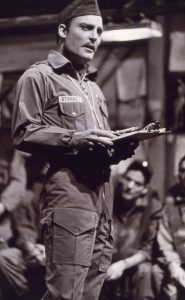
Stacy Keach in WE BOMBED IN NEW HAVEN, by Joseph Heller, directed by Larry Arrick, Yale Repertory Theatre. Photo © Henry Grossman, 1967.
I don’t remember that any of the four roommates in my quintuple in Weld Hall wanted to hear about my experiences when I got back. I probably never even thanked “Tom” for his good directions. No doubt, I let my brother Leon know some of the highlights, and certainly, I wrote a letter to my Mom and Dad to tell them many of the details, perhaps enclosing a playbill. (I could go a whole semester without calling them on the phone; we communicated almost exclusively through the mail.)
“We Bombed in New Haven” will not stand as the most outstanding theatrical performance I ever saw. If I had to choose, I would give those honors to August Wilson’s cycle of plays, one of which I saw in Providence and three in Boston. But it will forever stand as the biggest effort I ever undertook to get myself to a play. These days, most eighteen-year-olds who did something like I did would put up some photos and text about it on social media and look forward to a lot of “likes” and questions and comments. It seems I didn’t look for or need anyone else’s affirmation. The whole experience was intrinsically affirming and empowering. Thanks not just to Joseph Heller and Stacy Keach but to the Yale food services, for letting me sample those delicious eggs, English muffins, and sausages. Thanks to an anonymous guy who took a chance on driving an unknown hitchhiker with a suitcase to “Yukon.” Thanks to Dave and Bill, who had left Indianapolis a year ahead of me, and helped me to see we could all begin to forge new hopes and dreams on a bigger stage.
Dale Borman Fink retired in 2020 from Massachusetts College of Liberal Arts in North Adams, MA, where he taught courses related to research methods, early childhood education, special education, and children’s literature. Prior to that he was involved in childcare, after-school care, and support for the families of children with disabilities. Among his books are Making a Place for Kids with Disabilities (2000) Control the Climate, Not the Children: Discipline in School Age Care (1995), and a children’s book, Mr. Silver and Mrs. Gold (1980). In 2018, he edited a volume of his father's recollections, called SHOPKEEPER'S SON.


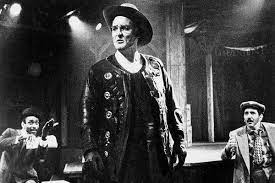
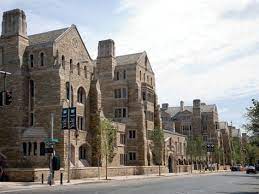

Thanx Dale for sharing your memorable theatre experience hitchhiking to New Haven for the Heller play, one I’m sorry this theatre lover hasn’t seen.
You’ve reminded me of times when I wanted to see sold out performances and was determined to move heaven and earth to get a ticket – and I did!
My assumption at the time was that when the play moved to Broadway, its title would change to “We Bombed in New York.” And if it went on the road, it might some other time be called, “We bombed in Detroit,” or “We Bombed in St. Paul.” I didn’t know that “bombing in New Haven”: was an expression that was appled to productions that didn’t do well enough in the pre-Broadway test to even make it to the big stage!
Wonderful description of why you wanted so desperately to get to New Haven to see that show and how you accomplished it, Dale. As soon as the driver picked you up on Storrow Drive and told you he was only going as far as “stores”, I knew your punchline, which cracked me up. As a fellow midwesterner, I empathize with your failure to communicate. My freshman year at Brandeis, I used to hear one of the girls on my floor talk about her Friday night plans as going to the “potty”. I couldn’t believe it!
I have known of (but have never seen) “We Bombed in New Haven” for many years, but it was only much later, when I learned of the tradition of Broadway-hopeful plays opening in New Haven for tweaking before heading for New York, that I got the joke.
And casual bigotry makes me sad, maybe more so than overt racism, which just pisses me off. There is a scene in a late Sopranos episode where Tony starts making antisemitic jokes to Hesh. You can see the sadness come over him as he realizes that Tony is not his friend, just a monster in a fancy suit. Jerry Adler plays this moment of epiphany perfectly. A great character actor at work is a joy to watch.